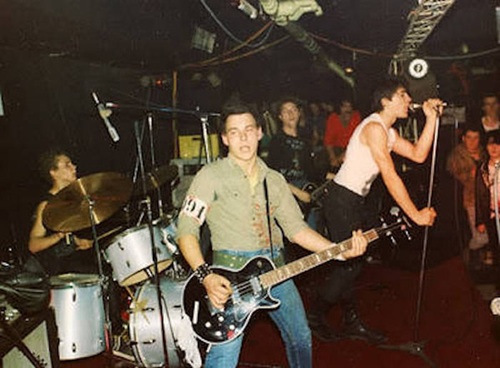La Broma de Ssatán is a punk band from Madrid, Spain. The band's name is also sometimes spelled, perhaps by mistake, as La Broma de Satán (with a single 'S'), and abbreviated (at least on the back cover of their first album) as B-SS. They have a long musical career, starting in 1980 with the outbreak of punk and the beginnings of the “movida madrileña”.
In 1982 Gabi, their original drummer, left the group (due to military service) and Pepino took his place, with whom they recorded their first album, a 12” EP, which was released at the end of the year. One of the seven songs included was the celebrated "Baila Pogo Sobre Un Nazi". In 1985, after the death of Pepino, they ended up splitting up, leaving a live album that would never be released.
After the separation, vocalist Fernando Alonso left the music. Goma (guitar) and Ixma (bass) continued playing in different groups, usually together. They formed part of El Beso Negro along with Pollo (Larsen, Commando 9mm) and Jordi Vila (Loquillo y los Trogloditas) in the early 1990s. In 2001, Ixma formed 4Teen Killers with people from groups like La UVI (Guillermo), Plouck and Pin Ups (Paquita) or Frisbees (César and Paco).
In 2000, the label Potencial Hardcore publishes a re-release of their first EP. After the great acceptance received, Ixma and Goma (guitar) incorporate the drummer Jordi Vila and another guitarist, Tony (from Mosquito Pick and Carbonas), and decide to give concerts again. That same year they are chosen to play as a backing band for Sylvain Sylvain (New York Dolls) on his spanish tour. This culminates with the recording of a live album in March 2001 in Gruta 77, which would be published by Desobediencia in 2003, when they celebrate their 25 years.
In 2004 they participate in the album 'Homenaje a Espasmódicos y a la Memoria de Kike Kruel', edited by Potencial Hardcore, with a new drummer, Jota. In 2006 was released a live EP with three songs, by Bazofia Records, two of the songs unreleased and recorded in April 1982 in the discotheque JR with the original line-up of the band (Fernando, Goma, Ixma and Gabi). They also announced the forthcoming release on vinyl of the recording of four tracks in 1982 in the TVE studios with Carlos Tena and a new album with new songs by the group. [SOURCE: WIKIPEDIA]



















